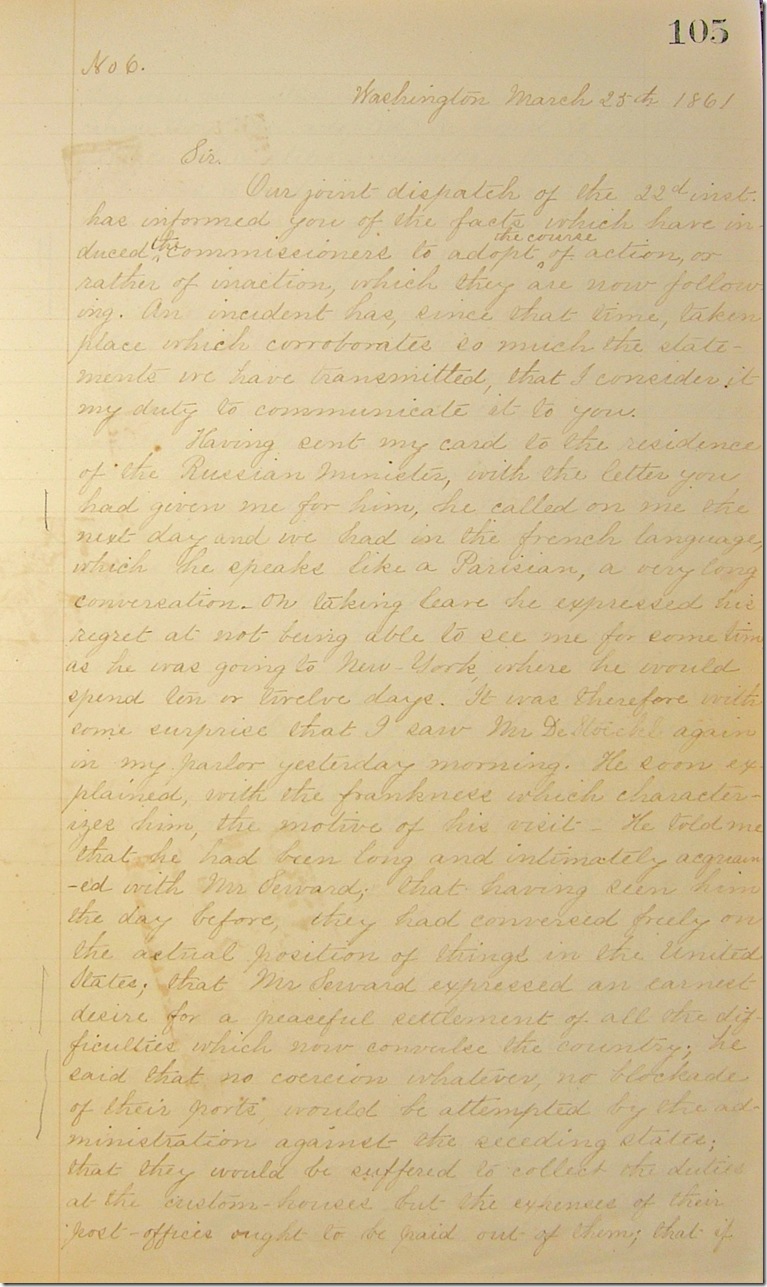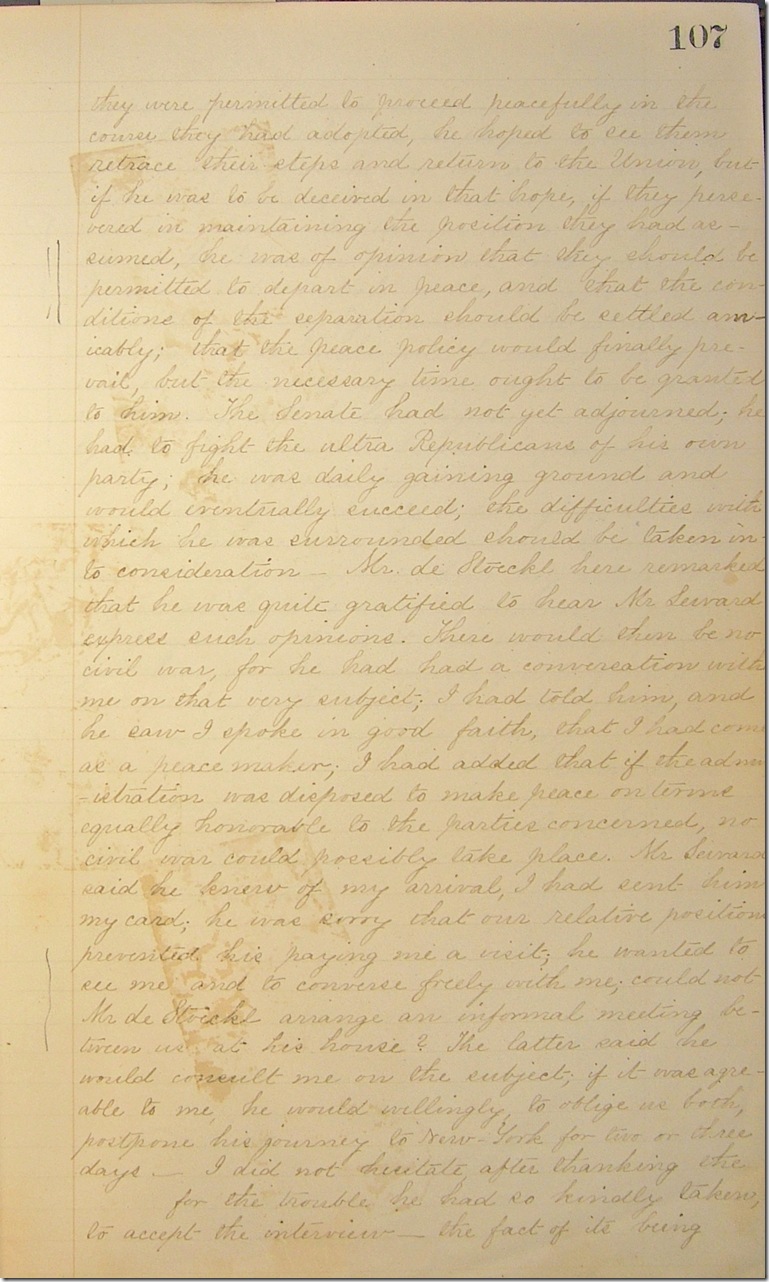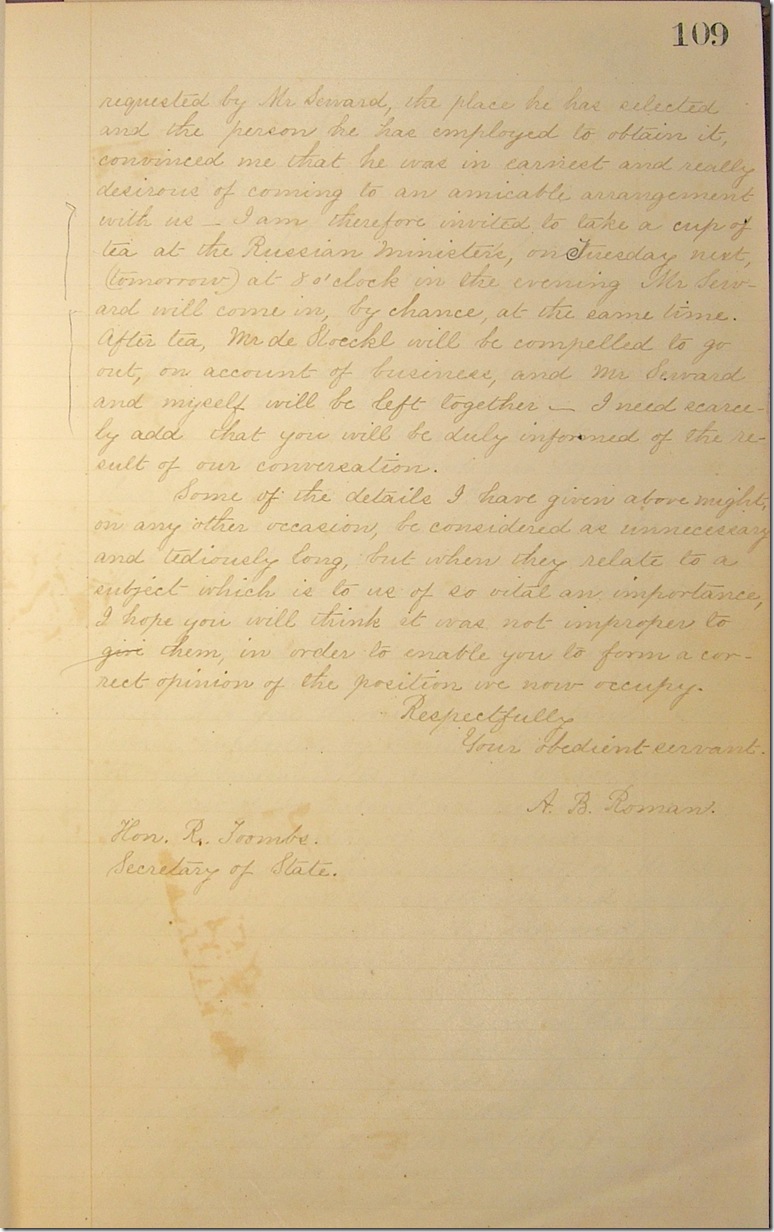During March and April 1861, after seven states had seceded and formed the Confederate States of America but before war broke out, Confederate Secretary of State Robert Toombs appointed Martin J. Crawford, John Forsyth, and A.B. Roman as Commissioners of the Confederate States to Washington, DC. Their purpose was to seek diplomatic recognition from the United States and negotiate peace—at least for a while. Central to the question of peace or war was whether the United States would continue to retain claim over federal forts located in the southern states that had seceded, including Fort Pickens in Florida and Fort Sumter in South Carolina. This item is transcribed from a letter book maintained by J.T. Pickett, secretary to the commissioners, containing copies of 72 letters, dispatches, and telegrams sent and received by the commissioners from the time of their appointment to the demand for the evacuation of Fort Sumter .
No 6.
Washington March 25th 1861
Sir.
Our joint dispatch of the 22nd inst. has informed you of the facts which have induced the commissioners to adopt the course of action, or rather of inaction, which they are now following. An incident has, since that time, taken place which corroborates so much the statements we have transmitted, that I consider it my duty to communicate it to you.
Having sent my card to the residence of the Russian Minister, with the letter you had given me for him, he called on me the next day and we had in the french language, which he speaks like a Parisian, a very long conversation. On taking leave he expressed his regret at not being able to see me for some time, as he was going to New York, where he would spend ten or twelve days. It was therefore with some surprise that I saw Mr De Stoeckl again in my parlor yesterday morning. He soon explained, with the frankness which characterizes him, the motive of his visit—He told me that he had been long and intimately acquainted with Mr Seward; that having seen him the day before, they had conversed freely on the actual position of things in the United Sates; that Mr Seward expressed an earnest desire for a peaceful settlement of all the difficulties which now convulse the country; he said that no coercion whatever, no blockade of their ports, would be attempted by the administration against the seceding states; that they would be suffered to collect the duties at the custom-houses but the expenses of their post-offices ought to be paid out of them; that if they were permitted to proceed peacefully in the course they had adopted, he hoped to see them retrace their steps and return to the Union, but if he was to be deceived in that hope, if they persevered in maintaining the position they had assumed, he was of opinion that they should be permitted to depart in peace, and that the conditions of the separation should be settled amicably; that the peace policy would finally prevail, but the necessary time ought to be granted to him. The Senate had not yet adjourned; he had to fight the ultra Republicans of his own party; he was daily gaining ground and would eventually succeed; the difficulties with which he was surrounded should be taken into consideration—Mr. de Stoeckl here remarked that he was quite gratified to hear Mr Seward express such opinions. There would then be no civil war, for he had had a conversation with me on that very subject; I had told him, and he saw I spoke in good faith, that I had come as a peace maker […] Mr Seward said he knew of my arrival, I had sent him my card; he was sorry that our relative positions prevented his paying me a visit; he wanted to see me and to converse freely with me; could not Mr de Stoeckl arrange an informal meeting between us at his home? […]I am therefore invited to take a cup of tea at the Russian Minister’s, on Tuesday next, (tomorrow) at 8 o’clock in the evening. Mr Seward will come in, by chance, at the same time. After tea, Mr de Stoekl will be compelled to go out, on account of business, and Mr Seward and myself will be left together—I need scarcely add that you will be duly informed of the result of our conversation.
Some of the details I have given above might, on any other occasion, be considered as unnecessary and tediously long, but when they relate to a subject which is to us of so vital an importance, I hope you will think it was not improper to give them, in order to enable you to form a correct opinion of the position we now occupy.
Respectfully
Your obedient servant.
A. B. Roman
Hon. R. Toombs.
Secretary of State.
Citation:Commissioners of the Confederate States of America to the Government of the United States, letter book.Washington, D.C., Feb 27-April 11, 1861.AMS 811/20


The stand off over Ft. Sumter continues to fester.